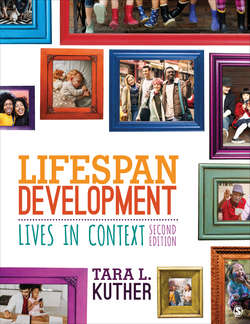Читать книгу Lifespan Development - Tara L. Kuther - Страница 379
На сайте Литреса книга снята с продажи.
Theory of Mind
ОглавлениеOver the childhood years, thinking becomes more complex. In particular, children become increasingly aware of the process of thinking and of their own thoughts. Theory of mind refers to children’s awareness of their own and other people’s mental processes. This awareness of the mind can be considered under the broader concept of metacognition, knowledge of how the mind works and the ability to control the mind (Lockl & Schneider, 2007). Let’s explore these concepts.
Young children’s theory of mind grows and changes between the ages of 2 and 5 (Bower, 1993; Flavell, Green, & Flavell, 1995; Wellman, 2017). For example, 3-year-old children understand the difference between thinking about a cookie and having a cookie. They know that having a cookie means that one can touch, eat, or share it, while thinking about a cookie does not permit such actions (Astington, 1993). Young children also understand that a child who wants a cookie will be happy upon receiving one and sad upon not having one (Moses, Coon, & Wusinich, 2000). Similarly, they understand that a child who believes he is having hot oatmeal for breakfast will be surprised upon receiving cold spaghetti (Wellman & Banerjee, 1991). Theory of mind is commonly assessed by examining children’s abilities to understand that people can hold different beliefs about an object or event.
Culture shapes children’s thinking. Samoan and Vanuatu cultures deemphasize internal mental states as explanations for behavior. Children are not exposed to discussions about the mind and they get little experience considering other people’s thoughts.
age fotostock / Alamy Stock Photo
